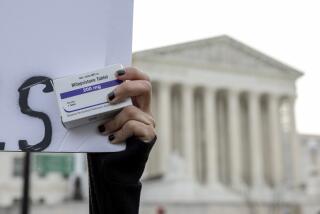POSICOR: 143 Sudden Deaths Did Not Stop Approval
- Share via
Senior FDA officials with the power to approve new drugs were warned in advance about the dangers of Posicor, a pill for high blood pressure and symptomatic chest pain.
The clinical studies of Posicor “cast a shadow of potential risk for serious arrhythmias,” FDA medical team leader Dr. Shaw T. Chen wrote on Dec. 18, 1996. The data in hand also showed Posicor would interact with certain other drugs, posing potentially severe risk.
A 70-year-old man suffered “sudden death” in one study of Posicor’s effect on chest pain. The senior FDA officials also were told of sudden deaths in 142 other patients who took either Posicor or a placebo in an ongoing study focused on congestive heart failure. However, details from the 2,400-patient study remained sealed because the manufacturer opposed breaking the experiment’s confidentiality until it was finished.
This left the FDA officials a choice: Wait a year or more, or approve Posicor without knowing the details.
“I sure don’t feel good about what I’ve seen,” said Dr. Lemuel A. Moye, a member of the FDA’s Cardiovascular and Renal Drugs Advisory Committee that met on Feb. 28, 1997. Moye, a physician and biostatistician at the University of Texas, suggested it would be prudent to delay judgment until the study’s results were unsealed. “I’m afraid that we are rushing into this.”
According to a transcript of the meeting, Moye voiced concern about Posicor’s effect on heart rhythm and its potential to interact with other compounds. “Patients will be taking this in fairly uncontrolled situations in combinations of drugs which have ramifications yet unknown,” he said.
Another committee member, Dr. Robert Califf, professor of medicine at Duke University, said: “If this [drug] was really something that was dramatically different, better than anything else in the way of relieving symptoms, then I would look at it differently. But given the fact there are a lot of other effective therapies out there, why not be safe with the public?”
Indeed, scores of other drugs for treating high blood pressure were already on the market, and Posicor was not proved to offer lifesaving benefit.
The drug’s manufacturer, New Jersey-based Hoffman-La Roche Inc., saw no need to delay.
“There is no signal that there is arrhythmic or potentially arrhythmic risk with the drug,” said Roche’s Dr. Isaac Kobrin, terming the sudden deaths of four patients in another study “a chance finding.”
The committee voted, 5 to 3, to recommend approval of Posicor, with Califf and Moye in the minority.
After presiding over the five-hour discussion, the committee chairman, Dr. Barry M. Massie of San Francisco, abstained from voting amid a financial conflict: Massie was a co-investigator in Roche’s ongoing study of Posicor. After that meeting, Roche hired him as a speaker for the drug, Massie acknowledges.
On June 20, 1997, the FDA approved Posicor.
Four days later, a Roche news release quoted Massie to buttress the company’s claim that “the incidence of side effects was low” during clinical studies of Posicor.
Asked about this sequence of events, Massie said, “You do wonder how the world would perceive it. I’m glad I didn’t vote, let’s put it that way.”
Doctors were cautioned in speck-sized type--beginning on the 278th line of the drug’s label and again on the 365th about prescribing Posicor in combination with various medications, including allergy pills, tranquilizers, a sleeping pill and the heartburn drug Propulsid.
Authorities in Sweden in mid-1997 saw sufficient danger to keep Posicor off the market. But the U.S. approval spurred high hopes for Roche. Analysts at one brokerage firm, Salomon Smith Barney, projected sales of $2.9 billion within four years.
Six months after approving Posicor, the FDA advised doctors of the pill’s “life-threatening” danger. The agency announced that it had “received reports of dangerously lowered heart rates in about 20 patients.” Roche agreed to a label change--advising that Posicor should not be taken in combination with cholesterol-lowering drugs. This brought to 26 the number of drugs that doctors were warned not to prescribe with Posicor.
On June 8, 1998, Roche announced Posicor’s withdrawal, citing “evolving information concerning the potential for drug interactions” and “preliminary results” from the ongoing heart failure study that had drawn the attention of the advisory committee.
The study, Roche said, showed that the patients gained “no overall” benefit from Posicor.
According to those familiar with the matter, the study also found that the patients given Posicor died at a rate about 10% greater than those who took a comparator. “It definitely did not look good,” recalled Fenichel, who was then the cardiac drug division’s deputy director.
Apart from the clinical research, records filed with the FDA show that doctors and others reported Posicor as a suspect in the deaths of 100 patients.
“Posicor should not have been approved,” Moye said. “Therefore, any death that was attributable to Posicor was an unnecessary death.”
The FDA’s Woodcock and Lumpkin wrote in their May 1999 medical journal article that the problems that sunk Posicor also were “unexpected.” Asked recently about this, Woodcock retreated slightly; she said that serious adverse reactions resulting from Posicor’s interaction with one drug “perhaps could have been anticipated.”
Overall, she said, the agency had hoped for better compliance with advice in the label to avoid the concomitant use of Posicor and the 26 other drugs it interacted with.
A spokesman for Roche, Martin Hirsch, declined to answer questions but said the company “demonstrated sound and responsible judgment in the way [it] developed, launched and marketed and withdrew Posicor. And we have cooperated with the FDA throughout.”
More to Read
Sign up for Essential California
The most important California stories and recommendations in your inbox every morning.
You may occasionally receive promotional content from the Los Angeles Times.













